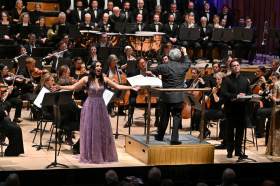The BBC Proms at the magnificent Royal Albert Hall are such a treasured part of London’s cultural calendar that I’m sure people go for the unique ‘promming’ experience just as much as the music. Each night is a different performance, with everything from Henry Mancini to A Midsummer Night’s Dream, and even a little bit of disco and some Dr Who to keep everybody happy.
Prom 72 was the penultimate Prom for 2024 and celebrated a couple of greats of the classical canon: the legendary Wolfgang Amadeus Mozart and the incomparable Ludwig van Beethoven. Nestled in between these two was a lesser-known female composer Louise Farrenc.
Played on period instruments by the talented Orchestra of the Age of Enlightenment (OAE), each piece had its own character, all shared a warmth of tone and a softness on the ear, due in part to the nature of the period instruments but more to the particular acoustics of the Albert Hall.
Opening strongly with Mozart’s First Symphony, written when he was all of eight years old, Italian conductor Antonello Manacorda led the players through a gentle and nuanced reading. There really is something very special about hearing these works played on instruments that the composers would have known and played in their own lifetimes.
The Symphony No 3, by 19th century French composer Louise Farrenc, offered the audience a new experience as it is rarely played in the concert repertoire. It is of the moment to champion lesser-known female composers and this highlighted that sometimes there can be little gems to discover.
Manacorda picked up the baton for this one, perhaps an indication that the piece was less familiar to the players too. There were some delightful moments, especially from the horn and clarinet and some pacy work in the impressive scherzo; it was no wonder Manacorda needed to mop his brow between movements! It’s always lovely to discover a new work or a little-known composer but, even so, there was nothing especially memorable about this piece.
After a well-earned interval, it was into a rousing account of Beethoven’s marvelous Third Symphony, better known as the Eroica (heroic). This is clearly a work Manacorda knows intimately and his conducting became ever-more colourful. Indeed, the funeral march shook off its mournful character to sound almost joyful – a celebration of the afterlife to come, perhaps. It’s always pertinent to remember that the Eroica was considered radical in its day for challenging, or even ignoring, the accepted symphonic forms. Music legend has it that attendees at its first performance in 1805, conducted by the composer himself, begged him to stop playing so they could leave.
Read: Exhibition review: Van Gogh: Poets and Lovers, National Gallery, London
The Albert Hall audience had no such desire to run away, sitting (and standing – it is the Proms, remember) breathless until the fiery end. Manacorda coaxed some especially fine work from the Orchestra. Described by the OAE as “unprecedentedly epic” this was a fine work to display their passion and finesse. It really was a great example of top-notch historically informed performance. Their efforts were well-rewarded with fulsome applause from the appreciative audience.
Prom 72: Mozart, Farrenc and Beethoven’s Eroica featured the Orchestra of the Age of Enlightenment with conductor Antonello Manacorda. It was performed for one night only on 13 September 2024, at the Royal Albert Hall, London.




